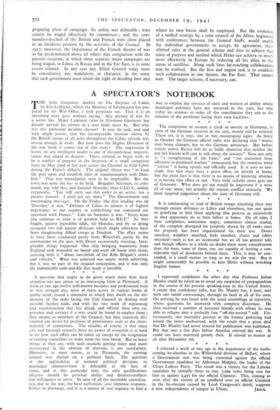A SPECTATOR'S NOTEBOOK
THE little fourpenny booklet on The Defence of Calais, by Eric Linklater, which the Ministry of Information has pre- pared for the War Office, a little perplexes me. That it is an absorbing story goes without saying. Any picture of war by a writer like Major Linklater (who in Northern Garrisons has already proved his talents in a new field) must be. But why was this particular incident chosen? It may be said, and said with ample justice, that the incomparable heroism shown by the British troops of all arms throughout the Calais episode was reason enough in itself. But how does the Higher Direction of the war think it comes out of this story? The impression it leaves on any intelligent reader is one of eleventh-hour improvi- sation that ended in disaster. There seemed, to begin with, to be a conflict of purpose in the despatch of a small composite force on May 22nd of last year across the Channel to hold Calais during the French debacle. The original object was " to keep the port open and establish lines of communication with Dun- kirk." That was immediately seen to be impossible. But the town was none the less to be held. Brigadier Nicolson, in com- mand, was told this, and General Ironside, then C.I.G.S., added, cryptically, " You will carry out this order in an active, not a passive manner. I need not say more." The Government sent encouraging messages. On the Friday (the first landing was on Thursday) it was, " Defence of Calais to utmost is of highest importance to our country as symbolising our continued co- operation with France." Late on Saturday it was, " Every hour you continue to exist is of greatest help to B.E.F." So they fought, against incredible odds, till Monday, and by so doing occupied two full panzer divisions which might otherwise have been slaughtering Allied troops at Dunkirk. The affair seems to have been conducted partly from Whitehall, partly by the commander on the spot, with Dover occasionally assisting. Inex- plicable things happened. One ship bringing munitions from England took wounded on board and went off home with them, carrying with it " about two-thirds of the Rifle Brigade's stores and vehicles." What was achieved was amply worth achieving, but it was no part of the original conception, and it was only the indomitable rank-and-file that made it possible.
* * * *






















 Previous page
Previous page